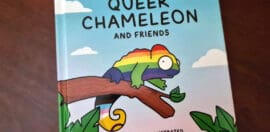Doco of the month: Geeta

8 September 2021 at 7:16 pm
Geeta is the story of one woman’s journey from being an acid attack survivor to fighting to give her daughters a better life. Wendy Williams talks to director Emma Macey-Storch and co-producer Dipanjali Rao about what they hope audiences take away from the film.
In the opening minutes of “Geeta”, we hear the film’s namesake retelling the moment her husband Inderjeet tried to kill her and her young daughters because she hadn’t given him any sons.
As they slept in their home in the urban slums of Agra, in India, Inderjeet threw a bottle of acid over them.
One of Geeta’s daughters was killed. Her other daughter, Neetu, was blinded.
In the three decades since, Geeta has made it her life’s mission to transform the lives of her daughters and give them independence.
Her fight against gendered-violence has catapulted her onto the national stage in India. She is the co-founder of a local activist movement Sheroes, and is fighting for law reform and justice for other acid attack survivors.
But this is not a film about the rise of a women’s rights movement in India. “Geeta” is an intimate portrayal of a mother’s desire to give her daughters a better life and the journey one family is on to confront what it means to create change.

Geeta’s fight against gendered-violence has catapulted her onto the national stage.
Director Emma Macey-Storch, who hails from Melbourne, spent five-and-a-half years in India, working closely with both Geeta and Neetu.
Macey-Storch says the unique thing about their story is that most people who experience an acid attack don’t survive to tell their tale.
Something else that sets this story apart, is that the perpetrator, Inderjeet, also appears on camera to share his experience.
Geeta and Inderjeet are still married.
While it is not uncommon for women in abusive relationships to stay with their perpetrators, it feels somewhat shocking to see the violence so openly acknowledged and discussed in his presence.
Macey-Storch admits that it was hard for her to reconcile what he had done and why he was there – and not in prison. But says she wanted to capture the true complexities of the issue and what it is really like to be a survivor.
“There is this contrast where you see Neetu and Geeta in this empowered situation at the Sheroes Cafe, where they are fighting for change, they are lobbying the government, they are protesting on the streets. They are everything we imagine an activist to be,” she says.
“And then that night they invited me back to their house and I was confronted with the reality that they were still living with their perpetrator and it made me question what does it really mean to create change.
“What I started to recognise was that the small degrees of progress that Geeta makes at home and in her neighbourhood and in her family are the true revolution.”
Co-producer Dipanjali Rao says there are a lot of myths that surround family violence that mean it comes as a shock to audiences to see Geeta living with her perpetrator, when perhaps it shouldn’t.
“I think the whole narrative around family violence and who perpetrates family violence has been misrepresented,” she says.
Macey-Storch points to statistics that show on average it can take a person in an abusive relationship eight times before they are finally able to leave for good.
Read more: Why doesn’t she leave?
In Geeta’s case, she fought for two and half years to put Inderjeet in prison. But later realised it was more dangerous for her to be a single mother, who was vulnerable in the community, than actually have him there.
“Geeta told me that she made the best decision that she could at that time,” Macey-Storch says.
Inderjeet’s presence in the film also reveals the disconnect between stereotypical ideas of how a perpetrator behaves and reality. Inderjeet is a quiet, diminutive figure, overshadowed by his wife and daughters who we see laughing and singing.

Inderjeet agreed to share his story so that other men wouldn’t do what he did.
Rao says he does not come across as “the kind of monster you would expect of someone who has conducted themselves with such monstrosity”.
“Yet, family violence perpetrators are very frequently amongst us, we work with them, we talk to them, we date them, they are our fathers, brothers, friends, we don’t want to talk about that,” she says.
“So I think that’s also quite shocking. What you imagine in your mind as to what a perpetrator might look like or behave like, Inderjeet is completely the opposite.”
When Inderjeet approached Macey-Storch, three years into filming, to ask if he could share his experience, he said it was so that other men wouldn’t do what he did.
The aim of the documentary is to encourage more people to have these difficult conversations.
Thanks to the support of a number of philanthropic organisations and donors the film-making team has developed a multi-year social impact strategy that will work alongside festival presentations (the film was recently screened at Melbourne International Film Festival) and community screenings to build visibility for the issues and help shift behaviours.
Geeta and Neetu have been very involved in the development of the social impact strategy, with Neetu planning to come to Australia, when she can get a flight.
“We’ll just have to start the minute she gets here,” Macey-Storch says.
“I am so determined, it’s not me going around the country telling Geeta and Neetu’s story over and over as a white woman, they have to be here, they have to have their voice heard because the power is in their voice,” she says.

Geeta is the story of a mother fighting to give her daughters a better life.
Neetu will launch a campaign called Wake Up, focusing on how people think about how gender bias drives violence.
A key focus is going to be on working with young adults, where Neetu believes the team can make fundamental change.
The aim is to deliver an Australia-wide program of community screenings and post screening workshops. The team has partnerships with community organisations and temples to help with the outreach, and they have collaborations with Rosie Batty as well as a number of Australian musicians, which speaks to Neetu’s talent for singing.
“So we’re going to start in Australia with our release here and take the film into communities and have those important conversations. And see how young people can think about solutions and what actions to take,” Macey-Storch says.
When it is safe to do so given the pandemic, Neetu and Geeta will also take the film into hundreds of schools across India to engage upper high school students in conversations on gender bias, gender equality, and respectful relationships.
“We have the aim to reach about a million students that way,” Macey-Storch says.
But both Macey-Storch and Rao are keen to stress that while the documentary is connected to India, it is very much a universal story.
“We want audiences to see that Geeta is not an Indian woman who is telling her story, Geeta is just a woman who happens to be Indian, who is reflecting the story of millions of women across the world,” Rao says.
For Macey-Storch, the key takeaway is that people can find solutions to their own problems.
“Despite what Geeta and Neetu have experienced in life, they are witty and funny, they are powerful, they make their own decisions, and they’re really striving to create their own destinies,” she says.
“I always had in my mind that I wanted people to leave the cinema and think, if Geeta and Neetu can rebuild their lives, can be part of this movement of change, can deal with everything they have to deal with and make an impact, why can’t I?”
For more information on “Geeta” visit the website or follow them on social media (Facebook, Instagram, Twitter). Those wanting to help, can make a donation via Documentary Australia Foundation. Every donation at the moment is going towards working with Neetu on the social impact release.
Anyone interested in hosting a screening or engaging Neetu or Geeta with their group can contact the filmmakers at geeta@somekindofsquirre.com
Each month Pro Bono Australia and Documentary Australia Foundation present a Doco of the Month, profiling powerful documentaries with social impact at their heart.
Documentary Australia Foundation is Australia’s only not-for-profit organisation that fosters social change through documentary storytelling.
If you or someone you know is experiencing violence or abuse, you can contact 1800RESPECT on 1800 737 732 or through online chat.







